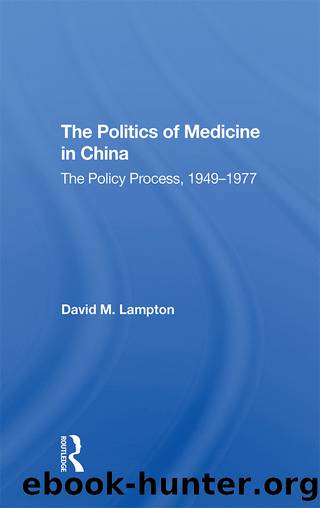The Politics of Medicine in China: The Policy Process 1949-1977 by David M Lampton

Author:David M Lampton [Lampton, David M]
Language: eng
Format: epub
Tags: Social Science, Political Science, World, Asian, Regional Studies
ISBN: 9781000307535
Google: sxGjDwAAQBAJ
Goodreads: 51869462
Publisher: Routledge
Published: 2019-07-16T00:00:00+00:00
Leadership Resources
Subsequent action policies reflected the fact that not all three policy-making arenas were hit in the same way by post-Leap changes in the resource base. In fact, it was the differential impact of resource declines which helps explain why some policy areas changed little and others more drastically.
The Nine Man Sub-committee. The economic, social, and political resources of the Sub-committee all changed rapidly in 1960. First of all, the "Sixty Articles," and the subsequent devolution of rural power to the production teams, meant that there was no longer an organizational structure capable of mobilizing the peasants. Secondly, because increasing agricultural production was the immediate need, both the government and the peasantry agreed about one thing: nothing should interfere with the drive to increase production. In the short-run, mass mobilization could be nothing but counterproductive to that effort.
Not only did economic and structural considerations weaken the Sub-committee, but so did changes in political relations at both the Center and within the Sub-committee itself. While information is scant, it appears that members of the Sub-committee were caught in a web of contradictory loyalties. Knowing the past opposition of Ministry personnel to the mass campaigns, one can conjecture that Hsu Yun-pei was continually subjected to the professional pressures emanating from the organization for which he was responsible. Similarly, Liao Lu-yen, as the Minister of Agriculture, was responsible for increasing agricultural production. When his duties on the Sub-committee conflicted with those as Minister, appears to have chosen to emphasize production.48 In short, not only had the political situation in the countryside altered, it had also changed within the Sub-committee.
Political relationships at the Center changed as well. Mao lost ground to more bureaucratically oriented leaders like Chou En-lai, Liu Shao-ch'i, Teng Hsiao-p'ing, and P'eng Chen (then First Party Secretary of Peking and member of the Politburo). Earlier we noted that Mao's preferences vis a vis mass campaigns and medical education either had been partially or wholly rejected. Mao, himself, said that Teng Hsiao-p'ing and Liu Shao-ch'i ignored him after 1959. The Chairman asserted that both men treated him,
. . . like their dead parent at a funeral. When we had a meeting, Teng Hsiao-p'ing always sat in the place furthest away from me. Since 1959 he has not briefed me on the work of the Central Committee Secretariat.49
It appears, then, that while the Sub-committee was fragmenting, Mao was losing his capacity to provide the momentum necessary to continue Sub-committee work; Mao's priorities may have changed as well. Both of these trends were intimately tied to the deteriorating rural situation.
The communes. The political and economic resources of cadres at the commune and brigade levels were even more dismal.
The higher authorities tried to shift on to the lower cadres much of the blame for the agricultural disasters of the post-1958 period. Consequently the cadres felt themselves ground between unreasonable superiors and a discontented peasantry and their resentment bred listlessness. The cadres of production brigades, in particular, felt that their position had been undermined by the devolution of power to the teams.
Download
This site does not store any files on its server. We only index and link to content provided by other sites. Please contact the content providers to delete copyright contents if any and email us, we'll remove relevant links or contents immediately.
What's Done in Darkness by Kayla Perrin(26619)
The Fifty Shades Trilogy & Grey by E L James(19100)
Shot Through the Heart: DI Grace Fisher 2 by Isabelle Grey(19083)
Shot Through the Heart by Mercy Celeste(18955)
Wolf & Parchment: New Theory Spice & Wolf, Vol. 10 by Isuna Hasekura and Jyuu Ayakura(17139)
Python GUI Applications using PyQt5 : The hands-on guide to build apps with Python by Verdugo Leire(17026)
Peren F. Statistics for Business and Economics...Essential Formulas 3ed 2025 by Unknown(16900)
Wolf & Parchment: New Theory Spice & Wolf, Vol. 03 by Isuna Hasekura and Jyuu Ayakura & Jyuu Ayakura(16841)
Wolf & Parchment: New Theory Spice & Wolf, Vol. 01 by Isuna Hasekura and Jyuu Ayakura & Jyuu Ayakura(16470)
The Subtle Art of Not Giving a F*ck by Mark Manson(14385)
The 3rd Cycle of the Betrayed Series Collection: Extremely Controversial Historical Thrillers (Betrayed Series Boxed set) by McCray Carolyn(14158)
Stepbrother Stories 2 - 21 Taboo Story Collection (Brother Sister Stepbrother Stepsister Taboo Pseudo Incest Family Virgin Creampie Pregnant Forced Pregnancy Breeding) by Roxi Harding(13678)
Scorched Earth by Nick Kyme(12788)
Drei Generationen auf dem Jakobsweg by Stein Pia(10985)
Suna by Ziefle Pia(10903)
The Ultimate Python Exercise Book: 700 Practical Exercises for Beginners with Quiz Questions by Copy(10620)
D:\Jan\FTP\HOL\Work\Alien Breed - Tower Assault CD32 Alien Breed II - The Horror Continues Manual 1.jpg by PDFCreator(10581)
De Souza H. Master the Age of Artificial Intelligences. The Basic Guide...2024 by Unknown(10552)
Scythe by Neal Shusterman(10370)
